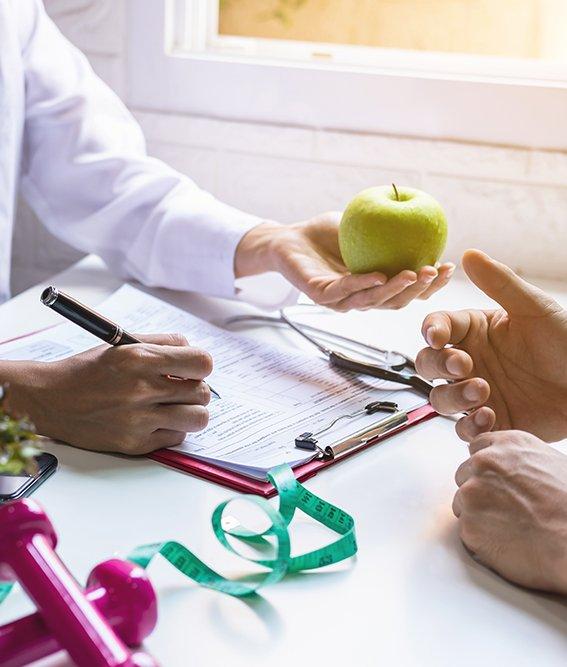Post-Surgery Nutrition: Foods to Eat and Avoid

Your body interprets surgery as an injury and releases hormones and inflammatory signals to protect itself. Post-surgery nutrition plays a crucial role in providing you with the vitamins, nutrients and minerals you need while you’re on the mend.
Why Nutrition Matters After Surgery
Following a surgical procedure, you may be at risk for:
- Infection
- Malnutrition
- Gastrointestinal complications
- Reduced energy
- Compromised immunity
- High blood sugar
You can address those side effects by consuming essential nutrients so your body can rebuild cells, generate new tissue and increase energy levels. Good post-surgical nutrition can help prevent infection, constipation and muscle atrophy, all of which are common following surgery.
Benefits of Post-Surgery Nutrition
Faster healing: Your body needs Vitamin C to rebuild collagen and soft tissue, especially around your incision or surgical site. The quicker you heal, the sooner you can get back to enjoying your usual activities of daily living.
Stable blood sugar: High blood sugar can occur following an operation and can impede the recovery process. Knowing which foods to eat and avoid can prevent further complications, especially if you have a chronic condition like diabetes.
More energy: Healing requires a lot of energy, so you may feel increased fatigue after surgery. You’ll need a well-balanced diet to supplement the nutrients your body uses to recover.
Muscle recovery: Your muscles can weaken due to inactivity. Eating a diet that includes plenty of protein can keep them strong, while magnesium and potassium reduce cramping.
Emotional health: Regulating your blood sugar can reduce mood swings and fatigue. Including complex carbs provides you with a steady supply of energy, which also supports emotional balance.
Protein
Surgery can strain your body, particularly your muscles, which is why you must include protein in your diet. Proteins are responsible for building and repairing tissue and providing your cells with structural support. Incorporating lean proteins into your meals can reduce muscle loss. It also stabilizes your blood sugar by slowing the rate at which glucose enters your bloodstream.
Hydration and Electrolytes
You may experience dehydration following surgery, especially if you lose blood during the procedure. Dehydration can slow healing, cause joint stiffness and increase your risk of blood clots. Drinking plenty of fluids maintains electrolytes, which regulate nerve and muscle function.
Drink plenty of clear liquids, including water, tea and broth to replenish depleted body fluids. Sports drinks and coconut water also offer a boost of electrolytes that can reduce muscle cramps, dizziness and confusion.
Foods to Eat After Surgery
Vegetables: Carrots, potatoes, broccoli, bell peppers, cabbage, spinach and romaine lettuce are good sources of vitamins that support post-op recovery. Vegetables also provide fiber to prevent constipation.
Fruits: Oranges, apples, peaches and tomatoes are packed with Vitamins A and C to help your body fight infection. Strawberries, blueberries, raspberries, blackberries and grapes have antioxidants that are essential for cell repair.
Lean meat and eggs: Lean poultry and seafood contain amino acids essential to tissue regeneration. Eggs are another excellent source of protein. One egg has zinc, folic acid, iron, B complex vitamins, calcium and Vitamin E, which helps scars heal.
Whole grains: Carbohydrates keep your brain energized and support muscles. Wild rice, whole wheat bread and quinoa will give your body the nutrients it needs to prevent you from feeling worn out.
Healthy fats: Olive oil, avocadoes, nuts and seeds contain fats your body requires to absorb other nutrients.
Foods to Avoid After Surgery
Consuming certain foods can slow healing and increase your risk of complications. For example, processed foods high in sugar and unhealthy fats can lead to inflammation. It’s crucial to be mindful of food choices during the post-op period to ensure positive clinical outcomes.
Foods to avoid include:
- Alcoholic beverages: Alcoholic drinks can dehydrate your body.
- High-fat foods: Meals that are high in fat can trigger nausea.
- Spicy foods: Spice can irritate your stomach or cause your body discomfort.
Meal Planning Tips for Post-Surgery Recovery
- Eat easily digestible foods following surgery, such as applesauce, oatmeal and bananas.
- Include nutrient-complex foods that contain a variety of vitamins and minerals.
- Aim for 20 to 30 grams of protein in each meal. Eggs are an excellent high-protein food item.
- Prepare multiple small meals to manage your appetite and avoid overeating. Doing so will also provide your body with a consistent source of energy.
- Cook meals in batches and freeze extras ahead of your surgery.
Empowering Recovery Through Nutrition
Ohioans Home Healthcare can help you create a balanced diet to help you fuel your body and recover from an operation. Contact us online or call 855-600-0806 to learn about our in-home skilled nursing services.

